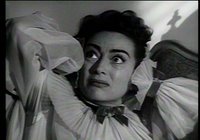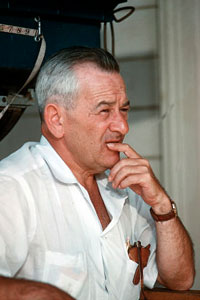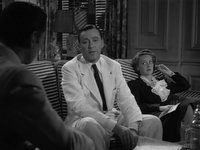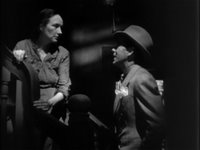
1. Going My Way A slobbery Great Dane cheek-lick to the Catholic clergy. Whimsical, wholesome horror. (The sequel, The Bells of Saint Mary's, is no favorite of mine either, but at least you have Ingrid Bergman adding a little sparrow-chirp of sex appeal.)
2. Rocky There is a noble American tradition of boxing movies--and this is the one that gets the Oscar?
3. Ben-Hur Not a patch on the silent version, a particularly irritating entrant in the Great Faith Demolition Derby of the 1950s, and the film some say cost Wyler any street cred with the Cahiers crowd. Stephen Boyd gives a marvelous performance, and yes, the chariot race is exciting, though let us not forget its pitiless violence and the obvious mistreatment of the animals. Otherwise, Ben-Hur is preachy, overlong and burdened with a lousy supporting cast. Haya Harareet, who courteously disappeared after this one, is the most vacuous love interest the Siren has seen in any Oscar-winning movie.
4. My Fair Lady Why does this have such a good reputation? Rex, who had been doing the part for ages at this point, stomps all over his fellow actors, so busy acting he forgets to do any reacting. Audrey, so good elsewhere, demonstrates here as in Breakfast at Tiffany's that she could no more portray a woman of the lower classes than she could fly. Nothing can dim the beauty of that incredible score, but the Siren plays her London cast recording over and over, and is never tempted to watch the movie again.
5. The Greatest Show on Earth This one, bad as it is, gives the Siren a small pang because she does enjoy it. It's most entertaining, in an Ignatius J. Reilly sort of way. Still, when she remembers C.B. DeMille's voiceovers, the ludicrous plot and Betty Hutton warbling "Come See the Circus," she has to list it.
6. The Sound of Music If it weren't for the Austrian Alps, Christopher Plummer (who called it "The Sound of Mucus") and Eleanor Parker (about twenty times more appealing than Julie Andrews, though her part is too short and usually cut to ribbons for TV showings) the Siren would not be able to sit through this. When Parker, as the Baroness, silkily mentions boarding school, can you honestly say you don't wanna holler "Amen"?
7. Out of Africa Easily the most boring Oscar winner I have seen.
8. The Great Ziegfeld I know I did a generally supportive post on Luise Rainer, and she's good here. But otherwise, this is such a programmatic rags-to-riches-to-heartache biopic that even Powell and Loy can't save it.
9. Hamlet This selection may raise eyebrows, but the Siren has seen many versions of Hamlet. This one, in terms of vigor, flavor and originality, is preserved in aspic.
10. Around the World in 80 Days Wears out its welcome, despite David Niven and the wonderful scenery. Of the cameos, only Charles Boyer and Ronald Colman actually play their parts, as opposed to popping onstage to milk applause.
Notes:
Unexpectedly, in going over the Best Picture list the Siren discovered that with the exception of Going My Way, which just makes her gag, there wasn't a single winner so bad she could derive no pleasure from it. The other nine films on her list all have something enjoyable about them, even if it's just the scenery, as in Out of Africa.
The Siren has not seen Cavalcade, Tom Jones, Dances With Wolves, Braveheart, Gladiator, A Beautiful Mind, Lord of the Rings (any of 'em) or Crash. She badly wanted to list Braveheart anyway, because it's Newt Gingrich's favorite movie and during the whole Contract on America she kept hearing the House freshmen compare themselves to "the Wallace." Ethics prevailed, however (as the Newt found out, hee hee). If she hasn't seen it, the Siren didn't list it.
The Siren thinks some films unfairly get their "bad" reputations from resentment over what they defeated. How Green Was My Valley is a beautiful, poignant, well-acted film, but it will forever be despised by many for beating the obviously superior Citizen Kane. Shakespeare in Love is a contemporary example. This is a marvelous romantic comedy, with a fresh and clever script by Marc Norman and Tom Stoppard (one of the Siren's favorite playwrights). But because it beat Saving Private Ryan, people dump all over it. The Siren counters, waving her copy of A Room of One's Own, that a movie is not a masterpiece simply because it deals with war, and another movie is not automatically fluff because it deals with the feelings of women and playwrights in a drawing room. Ryan, which has a brilliant opening and some very moving sequences, is still a flawed film with an overextended third act, some muddled Philosophy of War thinking, and a closing shot so insultingly, thuddingly obvious that the picture should have been disqualified on that basis alone.
The Broadway Melody is probably going to turn up on a lot of lists, but the Siren would like to point out that as an extremely early musical it won for its novelty more than anything else. It isn't so much bad, as it is an antique. Of course, the Siren freely admits her soft spot for golddigging showgirls, and she enjoys Bessie Love and Anita Page in this movie.
Madbeast.com's Hindsight Awards, a site the Siren loves, re-reads and mentally argues with all the time, ranks Cimarron as the worst Best Picture winner of all time, citing a bloated story line and racism that was jarring even in its day. The Siren has seen Cimarron, but remembers it so dimly that she didn't feel comfortable evaluating it one way or another. Probably she was watching it for Irene Dunne and trying to ignore everything else.






